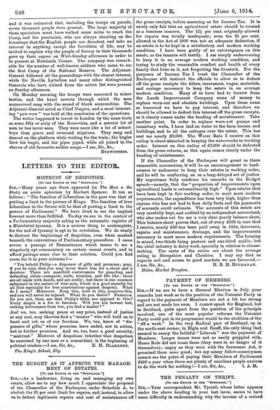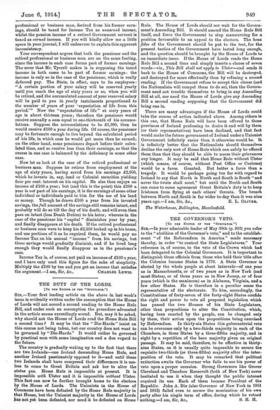THE PENALTY ON THRIFT.
[To MP Erman OP 2911 ..9190TATOP.."3 Srn,—Your correspondent Mr. Tyrrell, whose letter appears' under the above heading in your last issue, seems to have some difficulty in understanding why the income of a retired professional or business man, derived from his former earn- ings, should be taxed for Income Tax as unearned income, whilst the pension income of a retired Government servant is taxed as earned income. If you will kindly allow me a little space in your journal, I will endeavour to explain this apparent inconsistency.
Your correspondent argues that both the pensioner and the retired professional or business man are on the same footing, since the income in each case forma part of former earnings. The error that Mr. Tyrrell makes is in supposing the taxed income in both cases to be part of former earnings : the income is only so in the case of the pensioner, which is really deferred pay. The State, in effect, says to its employees : "A certain portion of your salary will be reserved yearly until you reach the age of sixty years or so, when you will be retired, and the accumulated amount of your reserved salary will be paid to you in yearly instalments proportioned to the number of years of your 'expectation of life from this period.'" Now the "expectation of life" at sixty years of age is about thirteen years; therefore the pensioner would receive annually a sum equal to one-thirteenth of his accumu- lations. Suppose the accumulations to be £1,300, then he would receive £100 a year during life. Of course, the pensioner may be fortunate enough to live beyond the calculated period of his life, in which case he would get more than he earned; on the other hand, some pensioners depart before their calcu- lated time, and so receive less than their earnings, so that the excess in one case is balanced by the deficiency in some other case.
Now let us look at the case of the retired professional or business man. Suppose he retiree from employment at the age of sixty years, having saved from his earnings £2,500, which he invests in, say, land or Colonial securities yielding four per cent. interest on his capital. He also then enjoys an income of £100 a year; but (and this is the point) this £100 a year is not part of his earnings, it is the earnings of some other individual or individuals paid to him for the use of his land or money. Though he draws £100 a year from his invested savings, the full amount of the savings still remains intact, and probably will do so till the day of his death, and will even then pass on intact (less Death Duties) to his heirs; whereas in the case of the pensioner his " capital " diminishes year by year, and finally disappears at his death. If the retired professional or business man were to keep his £2,500 locked up in his home, and use portions of it as he required them, he would pay no Income Tax on his annual " income " from his savings, but these savings would gradually diminish, and if he lived long enough they would finally disappear as in the pensioner's Case.
Income Tax is, of course, not paid on incomes of £100 a year, and I have only used this figure for the sake of simplicity. Multiply the £100 by ten and you get an income that satisfies











































 Previous page
Previous page